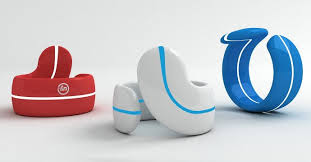India's baby steps towards wearable product pride


Belgaum is a dusty, water-starved town in the north of Karnataka—an underdeveloped part of the state that has been pointedly ignored by its politicians for decades and as far removed from the IT hype of capital Bangalore as possible.
Still, it has managed to produce people like Abhishek Latthe, 25, who armed with a degree from mechatronics from the UK’s University of Southampton developed a gadget called the Star according to this report that, while worn on the wrist or attached to clothing, can control smartphones by doing things such as calling contacts and launching apps or even monitoring the quality of your sleep.
The real star in this field, however, is RHL Vision Technologies, an incubated company from the southern paradise of Kochi's Startup Village that has come up with 'Fin,' a device that when worn around the thumb can control any device connected to it via Bluetooth such as a smartphone, a TV or a car's digital system using finger taps and swipes. The most impressive aspect of Fin is the roughly Rs 1.2 crore (US$200,000) it raised through crowdfunding after winning over some 1,600 backers, approximately doble of what it was taregting.
A few weeks ago, I wrote about Indian gaming pioneer Vishal Gondal who has launched his own wearable device.
Then there's Connovate Technology and its product 'Gecko,' one of the first companies out of India to spark attention in this space, helped in part by the fact that Gecko was endorsed by Apple co-founder Steve Wozniak on Twitter while backing it on crowdfunding platform Indiegogo. Its coin-sized Bluetooth device acts as a tracker, motion sensor and a controller of various electronic devices.
All of this is of course part of the huge oncoming global tsunami called wearable devices where all manner of gadgets, from the stables of Samsung to Google, are promising to make your life easier, social, healthier and more mobile.
Apparently, Indians are smack dab in the middle of this trend according to Accenture, whose digital consumer tech survey 2014 says that Indian consumers outstripped those in six other countries (Australia, Canada, India, South Africa, the UK, and the US) in terms of sheer desire to buy consumer electronic products across a wide range of categories. The Mint article says that they expressed maximum interest in smart watches, internet eyeglasses as well as fitness products.
India has always been poor in developing technology products so this is welcome news. Of course, for these companies and products to be more than a blip on the global eco-system wearable devices will take some doing since they will be up against ferocious competitors, big and small, with established supply chains and distribution channels. And staying ahead of all the latest breakthrows ways of design and utility makes this a perilous existence. Still, the players mentioned so far seem to have attracted serious attention from the large electronics manufacturers and decent orders for their products.
There are, however, party poopers to this tale of the rise of the Indian gadget, or more specifically the prospects of a big market here for them. "There are very few tangible use cases and it's more of an accessory", Shashin Devsare, executive director at Karbonn Mobiles, the number three smartphone player in India. In other words, nothing but a mere fad, he says. There is also the issue of price points, which would have to fall by half at the very least for a larger audience to contemplate buying them.
Chinese smartphone maker Gionee's India head Arvind Vohra feels that the main action is still in mobile phones and considering that the majority in India hasn't yet converted to smartphones (although that is happening fast) wearable devices will still be two big adoption steps away.